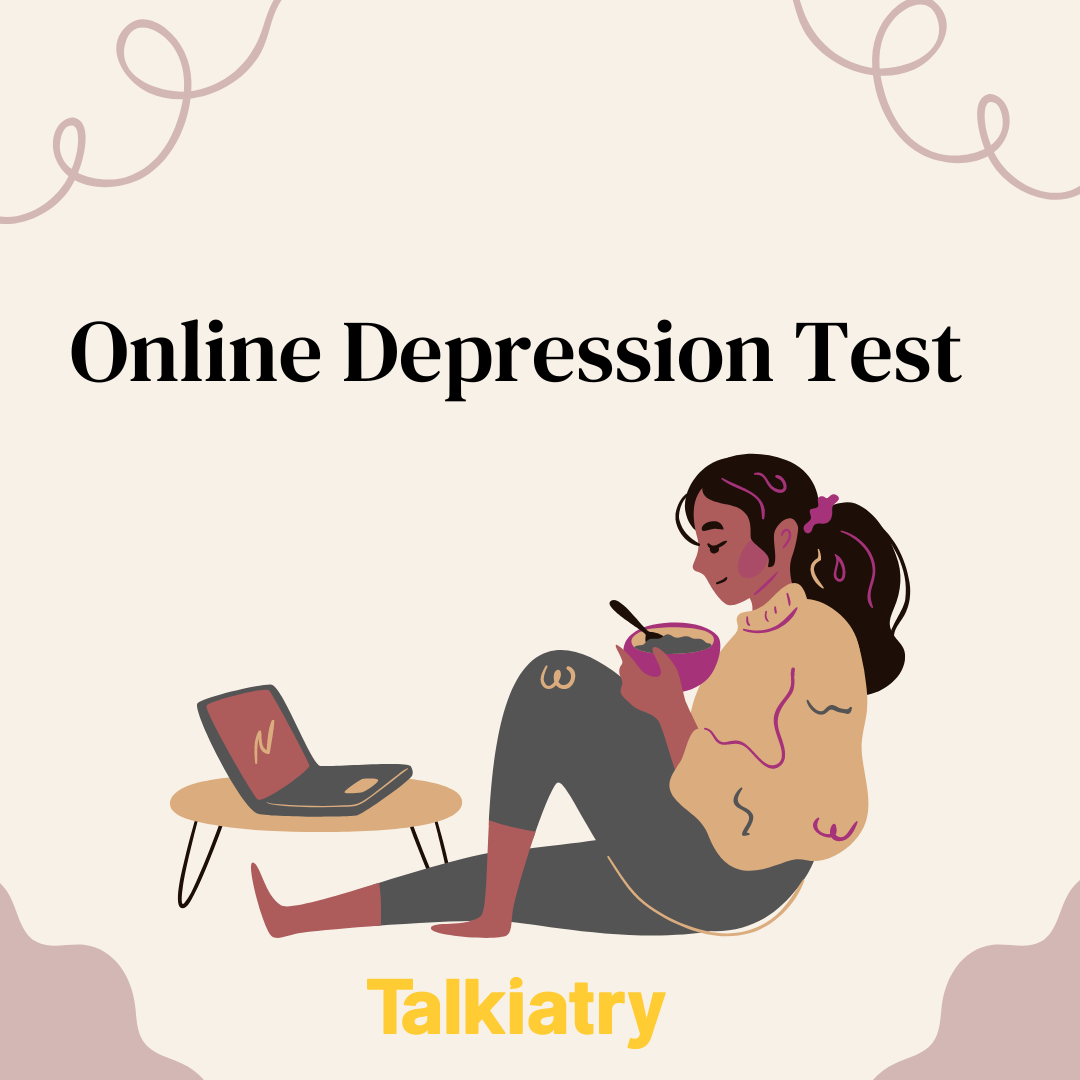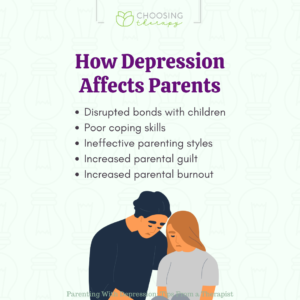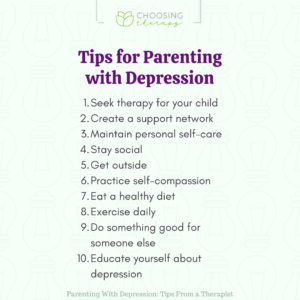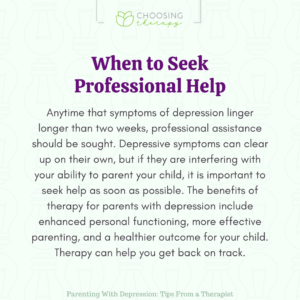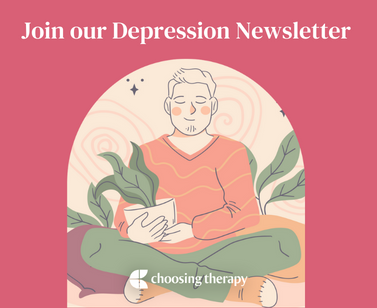Depression is one of the three most common mental health disorders, and it takes a devastating toll on an individual’s normal functioning.1 Being a parent can be challenging in itself, but when coupled with symptoms of depression, effective parenting can seem an impossible goal. However, there are ways to cope and be the best parent possible.
Parenting is stressful and challenging! Get support. BetterHelp has over 20,000 licensed therapists who provide convenient and affordable online therapy. BetterHelp starts at $65 per week. Take a Free Online Assessment and get matched with the right therapist for you.
How Depression Affects Parents
While everyone can feel sad or overwhelmed on occasion, especially parents, depression is more than just a passing mood. Parenting is a full-time job and when a parent’s capacity for being present is compromised by depression, significant disruptions to the parental bond and children’s well-being can occur.
There is more than one type of depressive disorder, but the most common symptom of these include experiencing a depressed mood, such as feelings of sadness, helplessness, loneliness, and hopelessness, as well as the inability to find pleasure in life. While the symptoms of depression experienced will vary for everyone, they can lead to substantial challenges in daily functioning when severe. For parents, these difficulties may cause significant impacts throughout their parental journey.
Parental depression can sometimes result in:
Disrupted Bonds With Children
Depression saps the physical and emotional energy out of a parent. When a parent is unable to be emotionally present with their child, the development of healthy parent-child bonds is interrupted.
During a bout of depression, parents are unable to tend to their own needs, and typically lack the energy to attend to such basic tasks as personal hygiene or leaving their beds. The bond between parent and child is the product of prolonged interaction and engagement, so when a parent is absent from the caregiving of their child, the development of the bond is impaired. The disruption does not have to be permanent if the parent is able to engage in treatment for their depression.
Poor Coping Skills
When dealing with depression, parents are not able to show up in life the way they might want to, nor are they able to manage or cope with the everyday stressors that parenthood presents. Depression compromises focus and concentration as well as logical thinking, so depressed parents may turn to maladaptive behaviors or coping skills to deal with their depression and life.
Parents typically serve as role models for their children and try to encourage autonomy and problem-solving in their developing child. However, when a parent is unable to manage the daily routines of parenting, such as discipline, positive interaction, or the provision of nourishing meals, they cannot meet the physical needs or the emotional needs of their child. They also model poor coping skills and children may follow their parents’ lead, further multiplying the damage done by depressive symptoms.
Ineffective Parenting Styles
When dealing with depression, parents may not be in the best place to choose the most effective parenting style to raise their children. With depression, logical thinking and decision-making may become impossible, resulting in parents who are unable to be consistent in their behaviors. Parents are expected to be intentional in their behavior, and depression robs people of the ability to show up in a consistent, reliable manner.
Depressed parents or their partners may resort to an authoritarian parenting style, which includes strong demands of children with little interpersonal warmth. Parental depression may also lead to a permissive parenting style which can give children too much freedom to make mistakes. Finding an effective and manageable parenting style can seem like an unattainable goal when dealing with parental depression.
Increased Parental Guilt
While children often complain that parents are always “guilting them” into doing things, parental guilt is perhaps even more pervasive an issue–especially when a parent is dealing with depression. Some of the symptoms of depression include feelings of worthlessness and inappropriate levels of guilt. Both mom guilt and caregiver guilt are already very real concerns, and coupled with depression, they can grow quickly into overwhelming and stultifying issues.
Parents take great ownership in their children’s development and while this may lead them to a sense of self-congratulation when a child thrives, it also leads to an overwhelming sense of guilt and failure when their child stumbles. Parental depression deepens only the negative side, and depressed parents can be smothered by the guilt they feel for not being as present and involved in their child’s life as they feel they should be.
Increased Parental Burnout
Being responsible for the well-being of another human being is a tough order, and parents who are otherwise healthy may feel overwhelmed by the obligations of parenting. In fact, caregiver burnout, parental burnout, and mom burnout are frequently addressed challenges.
Parental burnout is hallmarked by a pervasive sense of exhaustion from caregiving, feeling disconnected from the children, and self-doubt in the ability to effectively parent. These three symptoms clearly overlap with symptoms of depression such as lack of energy, pleasure, and self-worth. Addressing the symptoms of depression can also address and minimize those of parental burnout.
Help For Depression
BetterHelp – Get help from a licensed therapist. BetterHelp offers convenient and affordable online therapy starting at $65 per week. Free Assessment
Talkspace – Online Therapy With Or Without Insurance. Talkspace accepts many insurance plans including Optum, Cigna, and Aetna. Typical co-pay is $30, but often less. Get started
Impacts of Parental Depression on Children
There are multiple ways that parental depression affects children. In fact, growing up in a home with a parent dealing with mental illness is considered an adverse childhood event. From navigating childhood to establishing and maintaining adult relationships, parental depression can impact children across the lifespan.
Below are possible impacts of parental depression on a child:
- Increased anxiety: Depression affects how parents behave and respond to their children. When a parent’s response is unpredictable, children may develop anxiety as they do not know what to expect day-to-day or even hour-to-hour.
- Attachment disorders: A parent’s mental illness can derail the normal attachment process between parent and child. Unable to feel that their parent provides a secure, reliable connection can result in a child unable to form healthy attachments as an adult.
- Lack of self-esteem: A child’s self-esteem and self-worth are formed based on their parents’ engagement with them and the positive feedback they receive. When a parent is unable to be actively involved in their child’s life and provide the necessary feedback to build a child’s sense-of-self, the child may reflect the feelings of worthlessness that their parent displays.
- Poorer physical health: Depression not only diminishes a person’s ability to attend to their own needs, but it also compromises their ability to care for others. Children may suffer by parents not noticing or attending to a child’s physical wellbeing.
- Inability to trust: Trust is the basis for all healthy relationships. When a child’s early experience with their caregiver indicates that others are not to be trusted, their future relationships may all be threatened due to their inability to trust others.
10 Tips for Parenting With Depression
If you are struggling with depression, it is essential that you invest as much energy as you can into supporting your child’s well-being. Being a parent requires sacrifice, but knowing that you are trying to be the best parent you can be makes the sacrifice worth it.
Below are 10 tips for parenting effectively with depression:
1. Seek Therapy for Your Child
When you are unable to be the parent your child needs, it is wise to see professional assistance for your family. Therapists provide safe and secure environments where children can build trusting relationships and feel safe in the predictability of the therapy setting. The first session may seem scary to your child, so actively support your child or teen during therapy.
2. Create a Support Network
Every parent needs to have a strong support network in place as it really does take a village to raise a child. When you’re struggling with depression, a support network can be even more important as the need for assistance can be much greater. To ensure that your children receive the attention and the care that they deserve, populate your network with family members, friends, and any professionals–such as teachers and therapists–who can be helpful.
3. Maintain Self-Care
Keeping to a daily routine is one of the best self-help measures for battling depression. By forcing yourself to wake up, get a shower, and engage with others, you are actually caring for yourself in important ways.
The benefits of self-care include decreasing symptoms of depression and enhanced self-esteem. Self-care isn’t just about bubble baths or massages; it can include emotional self-care such as journaling or engaging in meditations specifically designed to lessen feelings of depression.
4. Stay Social
The tendency to isolate is a symptom of a depressed mood, but it is important that you keep showing up in order to keep things as normal as possible for your child. Making sure you are present and that your child has healthy interactions with others goes a long way to supporting their development.
5. Get Outside
It is excellent for your mental health to be outside and soaking up sunlight and basking in nature. 3 Depression symptoms ease as do symptoms of anxiety, as well. Children also benefit from being outside and having a space to expend their energy and explore. Working with a therapist who provides Walk and Talk Therapy might be a helpful option.
6. Practice Self-Compassion
Be kind to yourself and recognize that what you’re feeling and experiencing are symptoms of a disorder. Explore ways to show yourself love as you work to minimize any feelings of worthlessness or uselessness that depression generates. By reminding yourself–and others, too, if necessary–that you are suffering from a condition, you actually put yourself and your support network in a position to help fight the depression. Mental disorders are just like physical disorders, and you should not consider yourself the problem.
7. Eat a Healthy Diet
Nutritional psychiatry, which explores the link between diet and mental health, suggests that what we eat plays a significant role in how we feel. Healthy eating makes for a healthy emotional state and body. Fresh fruits and veggies offer protection from anxiety and depression.
8. Exercise Daily
Getting regular exercise, even if you have to force yourself to do it, can lessen depressive symptoms. Exercising the body has many benefits and can spur the production of endorphins. It also promotes nerve growth which generates new neural connections. Exercise can also grow the hippocampus, which is the part of the brain that regulates motivation and emotions, among other functions. For people with symptoms of depression, it tends to be smaller, but exercise can help lift your mood.
9. Do Something Good for Someone Else
Giving another person a reason to feel grateful can actually positively affect your own mood. When you volunteer or engage in altruistic acts, you actually boost your own dopamine levels, and this helps combat feelings of depression.
10. Educate Yourself
Parental depression can feel debilitating, but when you take time to learn more about the disorder and other self-help techniques, you can feel more empowered to manage the symptoms. In addition, if you are a new parent, educate yourself about postpartum depression, which is more common than you might realize.
When to Seek Professional Help
Anytime that symptoms of depression linger longer than two weeks, professional assistance should be sought. Depressive symptoms can clear up on their own, but if they are interfering with your ability to parent your child, it is important to seek help as soon as possible. The benefits of therapy for parents with depression include enhanced personal functioning, more effective parenting, and a healthier outcome for your child. Therapy can help you get back on track.
There are many ways to find a therapist who is a good fit for your needs that range from asking close friends or family members for recommendations or exploring an online therapy directory. Additionally, relying on your support network is encouraged as you tackle your depression. Being honest with your family and friends allows them to assist you in the most valuable ways, whether it is helping you manage daily caregiving duties or sitting with your child while you are meeting with a therapist. For younger children, they may thrive in play therapy settings whereas older children may want to be a part of family therapy. Gauge your choices on your own child’s maturity and developmental level.
Therapy options for depression while parenting include:
- Parent coaching: Effective parenting is about having the appropriate skills. Through parent coaching, parents can be provided with skills training that improves communication, helps rebuild positive relationships, and supports the healthy development of children.
- Couples therapy: Mental health disorders can cause significant problems between couples due to misunderstandings of the condition. Couples therapy can be especially helpful when the partner of someone with parental depression blames their partner for their behavior and not the disorder.
- Family therapy: This provides a space where all of the members of a family can actively participate and share their own perspectives and experiences. Family therapy helps ensure every voice is heard and validated.
- Cognitive behavioral therapy (CBT): This therapy has proven to be one of the most effective treatments possible for mood disorders, including depression. CBT for depression offers clients tools needed to change behaviors by changing their thoughts.
- Play therapy: Play therapy can be helpful for children who are dealing with difficult experiences and may be unable to verbalize their complicated feelings.
- Group therapy: Group therapy can be especially effective in normalizing mental disorders, finding support, and sharing ideas to best cope with the challenges being faced. Both adults and children can benefit from group therapy.
If you believe you, or someone you care about, is in a mental health crisis, time may be of the essence, so seek help as quickly as possible. Consider calling 988, the Suicide and Crisis Lifeline.
Final Thoughts
It is not just new moms who experience depression. Any parent of a child of any age can experience this condition, as it is one of the most commonly diagnosed mental disorders. Parenting is challenging work and when symptoms of depression appear and add to the responsibilities of parenthood, it can be overwhelming. Seeking help as quickly as possible can make a significant difference in your well-being, relationships, and for your child.
Additional Resources
To help our readers take the next step in their mental health journey, Choosing Therapy has partnered with leaders in mental health and wellness. Choosing Therapy is compensated for marketing by the companies included below.
Talk Therapy
Online-Therapy.com – Get support and guidance from a licensed therapist. Online-Therapy.com provides 45 minute weekly video sessions and unlimited text messaging with your therapist for only $64/week. Get Started
Online Psychiatry
Hims / Hers If you’re living with anxiety or depression, finding the right medication match may make all the difference. Connect with a licensed healthcare provider in just 12 – 48 hours. Explore FDA-approved treatment options and get free shipping, if prescribed. No insurance required. Get Started
Depression Newsletter
A free newsletter from Choosing Therapy for those impacted by depression. Get helpful tips and the latest information. Sign Up
Learn Anti-Stress & Relaxation Techniques
Mindfulness.com – Change your life by practicing mindfulness. In a few minutes a day, you can start developing mindfulness and meditation skills. Free Trial
Choosing Therapy Directory
You can search for therapists by specialty, experience, insurance, or price, and location. Find a therapist today.
Online Depression Test A few questions from Talkiatry can help you understand your symptoms and give you a recommendation for what to do next. Best Online Psychiatry Services Online psychiatry, sometimes called telepsychiatry, platforms offer medication management by phone, video, or secure messaging for a variety of mental health conditions. In some cases, online psychiatry may be more affordable than seeing an in-person provider. Mental health treatment has expanded to include many online psychiatry and therapy services. With so many choices, it can feel overwhelming to find the one that is right for you.